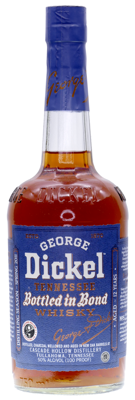|
|
Release Notes
At its core, the award-winning George Dickel Bottled in Bond series is rooted in transparency and authenticity, providing whisky fans a chance to experience the style most known for the traits found at Cascade Hollow Distilling Co.
George Dickel
3rd Party Tasting Notes
Pecan, maple syrup and dried apple.
George Dickel
The Distillery: George Dickel (aka Cascade)
| Silent since: False |
| Address: 1950 Cascade Hollow Road, Normandy, TN 37360, USA |
| → website |
In 1931, Schenley attempted to buy the Jack Daniel"s brand. After their offer was refused, they decided instead to return one of their own brands to its roots and compete. In 1958, after the passage of enabling legislation and a referendum, Schenley"s Ralph Dupps reconstructed the Cascade Hollow distillery and the original recipe, and George Dickel Tennessee Whisky was first bottled in 1964. They opted to use George Dickel"s name as the trademark because of the reputation the Cascade brand had gained as a value-priced bourbon. Schenley shut down the Tennessee bottling line in the 1980s and the whisky has since been hauled in tanker trucks for bottling elsewhere. Various mergers and buyouts have resulted in Diageo PLC owning the Dickel brand.
Increased production of George Dickel in the 1990s caused supply to exceed demand. In response, the distillery was closed to allow the whisky"s value to rebound. The distillery was reopened in 2003, almost too late to prevent a shortage of Old No. 8 in the market by 2007. Diageo floated a younger, three-year-old expression branded Old-Fashioned Cascade Hollow Batch Recipe to fill in any gaps. Once new stock of Old No. 8 appeared on shelves, the Cascade Hollow Batch proved unpopular and has been discontinued. The Cascade Distillery currently operates under the supervision of Master Distiller John Lunn.
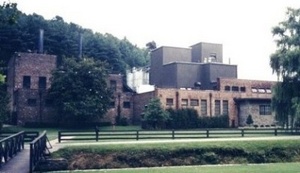
After Dickel"s death, his share in the company was willed to his wife Augusta, along with the advice to sell out. Augusta opted instead to retain her share of the company until the time of her death in 1916, when his brother-in-law and long-time business partner V. E. Shwab took over full control of the distillery. Tennessee prohibition forced distilling operations to move to Kentucky in 1910. National Prohibition forced them to shut down altogether.
In 1933, national prohibition was repealed. Shwab had died in 1924, and in 1937 his family sold the Cascade trademark to the Schenley Distilling Co. In the 1940s and 1950s, their product, produced in Louisville, Kentucky, was marketed as Geo. A. Dickel"s Cascade Kentucky Straight Bourbon Whisky.
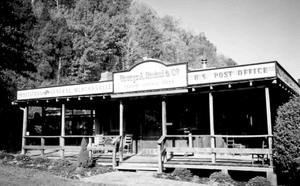
George Dickel"s Tennessee Whisky uses the traditional Scottish spelling of whisky (as opposed to whiskey). Reportedly, this is because Dickel believed his product to be as smooth and high in quality as the best Scotch whiskies. The distillery is part of the American Whiskey Trail and offers tours to the public.
George Dickel was born in Germany in 1818. He founded a retail business in Nashville, Tennessee, in the 1850s. Cascade Tennessee Whisky was first produced in 1870. The Cascade Hollow distillery was founded in 1877 by John F. Brown and F. E. Cunningham. George Dickel bought a controlling interest in the distillery in 1884. He also bought the exclusive rights to bottle and sell the whisky. Dickel withdrew from daily operations of the distillery in 1888 and died in 1894.
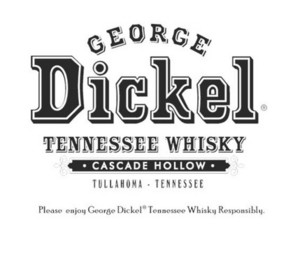
George Dickel is the name of a brand of Tennessee whisky manufactured in Cascade Hollow, Tennessee, near Tullahoma. The brand is now owned by Diageo PLC. Three whiskies are produced at the George Dickel Distillery: George Dickel Old No. 8 Brand, Superior No. 12 Brand, and Barrel Select Tennessee whiskies. Old No. 8 Brand, with the black label, is an 80 proof whisky and sells for an average price of US$17 for a 750ml bottle; Superior No. 12 Brand, with the ivory label, is 90 proof, and sells for an average price of US$19 for 750ml. The Barrel Select is 86 proof, and prices vary dramatically depending on market.
from Wikipedia
The Owner: Diageo
| Established: 1997 |
| Silent since: False |
| Address: 8 Henrietta Place, London, W1G ONB, UK |
| → website |
Diageo also distributes Unicum, its lighter-bodied variant Zwack and Jose Cuervo tequila products in North America. However, Cuervo operates as a separate company in Mexico and is not owned by Diageo. Similarly Grand Marnier is distributed by Diageo in many markets, including exclusively in Canada, and a deal was reached in 2009 to significantly expand this partnership in Europe.
Furthermore, Diageo owns the Gleneagles Hotel.
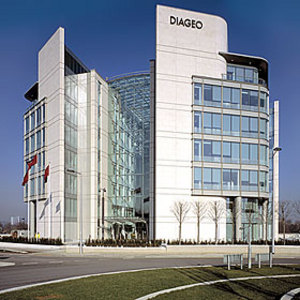
Diageo was formed in 1997 from the merger of Guinness plc and Grand Metropolitan plc. The creation was driven by the two executives Anthony Greener and Philip Yea at Guinness plus George Bull and John McGrath of Grand Metropolitan. The product portfolios of Guinness and Grand Met were largely complementary with little overlap.
Diageo is the world"s biggest whisky producer with 28 malt distilleries and two grain distilleries.The company operates the Scotch whisky distilleries of Auchroisk, Benrinnes, Blair Athol (situated at Pitlochry), Caol Ila, Cardhu, Knockando, Glen Elgin, Clynelish, Cragganmore, Dalwhinnie, Glenkinchie, Glen Ord, Lagavulin, Oban, Royal Lochnagar, Strathmill, Talisker, Teaninich, Mannochmore, Mortlach and Glenlossie, which are sold not only under their own name but used to make the various blended scotch whiskies sold by the company, and owns the stock of many closed distilleries such as Port Ellen, Rosebank, Brora, Convalmore, Glen Albyn, North Brechin, Banff, and Linlithgow. The company have opened a new malt distillery adjacent to their maltings at Roseisle (1st new make spirit produced Spring 2009). This will be one of the largest malt distilleries in Scotland. The new building contains 14 traditional copper pot stills. An expansion programme is also underway at its Cameron Bridge Grain Distillery in Fife that will make it the largest grain distillery in Scotland. Diageo also owns the Port Dundas Grain Distillery in Glasgow, and jointly operates the North British Grain Distillery in Gorgie, Edinburgh, with The Edrington Group.
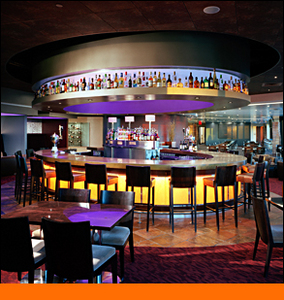
Diageo plc (LSE: DGE, NYSE: DEO) is the largest multinational beer, wine and spirits company in the world. The company is listed on the London Stock Exchange and has American Depositary Receipts listed on the New York Stock Exchange. The word Diageo was formed from the Latin dia (day) and the Greek geo (World), symbolising the use of the company"s brands every day, everywhere. Its head office is located in the City of Westminster in London. It is a constituent of the FTSE 100 Index.
Trivia:
- In December 2003, Diageo provoked controversy over its decision to change its Cardhu brand Scotch whisky from a single malt to a vatted malt (also known as a pure malt) whilst retaining the original name and bottle style. Diageo took this action because it did not have sufficient reserves to meet demand in the Spanish market, where Cardhu had been successful. After a meeting of producers, Diageo agreed to make changes.
- In 2006, the Cardhu brand quietly changed back to being a single malt.
- In July 2009, Diageo announced that, after nearly 200 years of association with the town of Kilmarnock, they would be closing the Johnnie Walker blending and bottling plant as part of restructuring to the business. This would make 700 workers unemployed and caused outrage from press, local people and politicians. A campaign against this decision was launched by the local SNP MSP Willie Coffey and Labour MP Des Browne. A petition was drawn up against the Diageo plans, which also involves the closure of the historic Port Dundas Grain Distillery in Glasgow.
- In February 2009 it was reported in the Guardian that the company had restructured itself so as to avoid paying tax in the U.K., despite much of its profits being generated in the U.K.
- Diageo is engaged in a tax scheme in the United States of America, commonly referred to as the "Rum Bailout", which will guarantee it USD$3 billion in revenues and profits.
- The National Puerto Rican Coalitionplans to run a series of ads in New York City and Puerto Rico urging a boycott of Diageo-owned alcoholic drinks to protest the giant British-owned corporation"s controversial production move of its Captain Morgan rum from Puerto Rico to the U.S. Virgin Islands.
from Wikipedia
